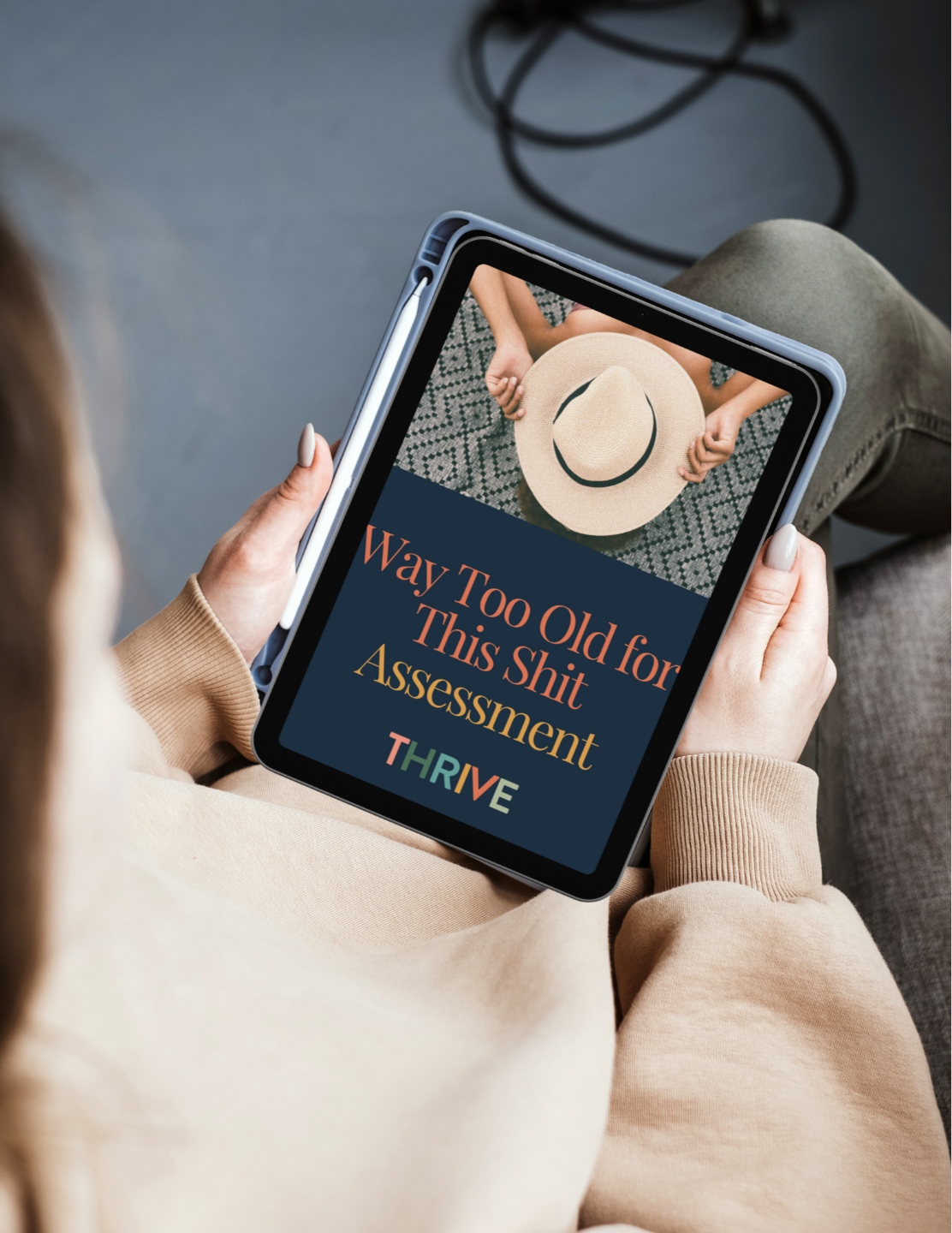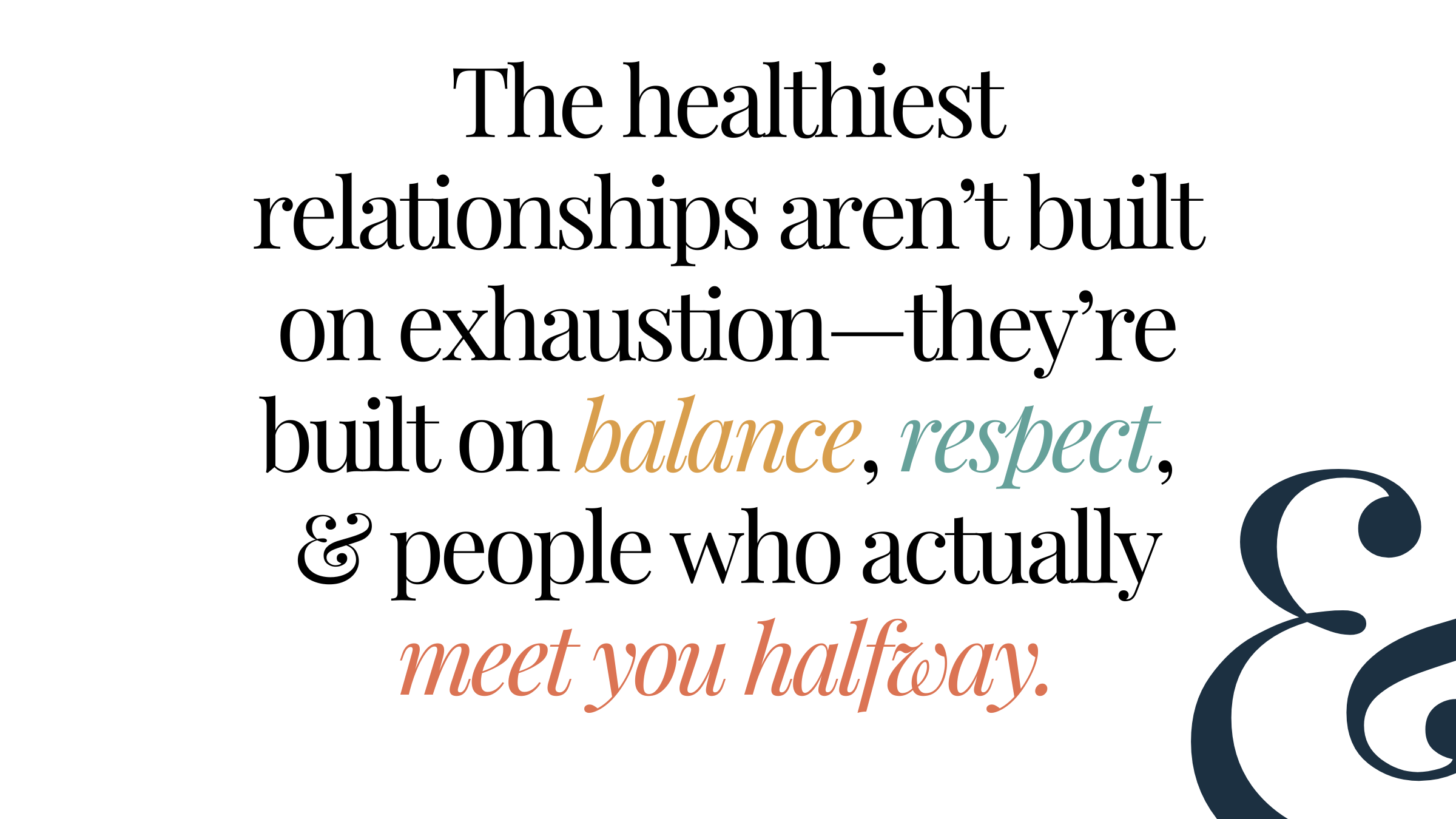![]()
ASSESSMENT RESULTS
You are an
Over-Giver
If someone needs something, you’re already three steps ahead—offering help before they even ask.
You remember birthdays, check in on people when they’re struggling, and somehow end up organizing everything from group gifts to emotional interventions. The problem? You’re exhausted.
You give so much that there’s rarely anything left for you, and deep down, you wonder why no one seems to notice when you’re the one who needs support.
I got you. Read on, my sisterfriend.


Characteristics of the Over-Giver
- You volunteer before anyone asks—and somehow end up doing most of the work.
- Saying no makes you feel deeply uncomfortable, like you’re letting someone down.
- You check in on people way more than they check in on you.
- You feel guilty resting if there’s still anything left to do (spoiler: there always is).
- You rarely ask for help, because it feels easier to just handle it yourself.
How we got this way
For Gen X and elder Millennials, over-giving isn’t a habit—it’s a survival skill we picked up from decades of handling everything solo and making sure everyone else was okay first.
Whether you were the responsible oldest sibling, the emotional go-between in your family, or just the friend who always showed up, somewhere along the way, you learned that being needed = being valuable.
But no one ever taught you how to set limits without guilt, so now you’re the one people rely on—whether you like it or not.
Why we are Too Old for this Shit
At this point, we’ve been the go-to person for way too long. The one who remembers birthdays, checks in first, volunteers without being asked, and somehow ends up managing everything from group texts to other people’s emotional baggage—whether we signed up for it or not.
And honestly? We’re too damn old for this sh*t.
We no longer have the time (or energy) for:
- Carrying relationships where we do all the work
- Being everyone’s unpaid therapist, assistant, and life coach
- Feeling guilty for resting while other people make messes we didn’t cause
- Automatically saying yes before even asking if we want to
- Wondering if people would still show up if we weren’t constantly over-functioning

Here's the hard truth...
Over-giving isn’t generosity
it’s self-abandonment in disguise.
And we know what happens when we keep doing it: we burn out, we resent people, and we end up in friendships and dynamics that suck the life out of us instead of filling us up.

But here’s the plot twist: You don’t have to stop giving—you just have to stop giving in ways that leave you drained, resentful, and wondering why no one ever thinks to return the favor.
Positive Psychology (and, frankly, science) teaches us that real generosity isn’t about running yourself into the ground—it’s about giving in a way that actually feels good.
Real connection isn’t built on you doing all the emotional labor; it’s built on balance, energy that flows both ways, and relationships that don’t require you to over-function just to keep them alive.

How to start changing this today:
01. Small & Solid Step Forward
Add in the Power of the Pause before saying yes –
Instead of automatically jumping in to help, use one of my Hold-Up Lines to give yourself a little time to ask:
- “Do I actually want to do this?”
- “Will I resent this later if it doesn’t feel reciprocated?”
Here’s the science: Your brain is wired for habit loops—meaning if you’ve spent years saying “yes” on autopilot, your default response will always be jump in and help now, figure out the consequences later. But studies on cognitive behavioral therapy (CBT) and neuroplasticity show that even a tiny pause before reacting can break that cycle and create space for a new, healthier response.
A simple 3-second pause gives your prefrontal cortex (the rational decision-making part of your brain) a chance to override the knee-jerk “yes” and actually check in with what you need. Over time, this practice retrains your brain to prioritize intentional choices over people-pleasing reflexes.
So next time someone asks for your time, energy, or emotional labor—pause, use a Hold-Up Line, and give yourself the chance to choose you first.
FREE HOLD-UP LINES PDF DOWNLOAD02. Medium & Mighty Step Forward
Ask What People Need Before Offering Help
Instead of automatically jumping in to fix, plan, or rescue, pause and ask what they actually need first.
Why? Because not every problem requires your full emotional labor, time, or problem-solving skills. Sometimes people just need to vent. Other times, they already have a plan and just want support. By asking first, you stop yourself from overextending—and make sure you’re actually giving in a way that helps.
Here’s the science: The brain is wired for autopilot behaviors, meaning if you’ve spent years over-giving, your default response is to jump in without thinking.
But research on emotional intelligence and social reciprocity shows that not all help is helpful—and when we constantly step in, we can unintentionally disempower others, create one-sided relationships, and reinforce burnout in ourselves.
Simply asking what someone actually needs (instead of assuming) creates healthier, more reciprocal relationships and stops you from depleting yourself unnecessarily.
This helps break the cycle of automatic over-giving while still being supportive—because showing up for people doesn’t mean solving everything for them.
FREE Support, Not Sacrifice ScriptsFOR PEOPLE WHO WANT TO
Get Shit Done!
No more waiting, wishing, or wondering if things will change.
If you are over your own bullshit, check out my Instructional Coaching with personalized support, science-backed tools, and a coach who gets it, to help you create the life you actually want.
Hi, I'm Kira
I’m a plus-size, neurospicy, no-BS, sweary Gen X podcaster & coach who thrives on big ideas, deep conversations, and a dash of ridiculousness.
My brain is a whirlwind of curiosity, connection, and creativity—sometimes chaotic, always passionate. I don’t do linear, I don’t do boring, and I definitely don’t do timelines (because life isn’t a checklist, and I’m on my own damn schedule).
Late Bloomer? Hell yes.
- Found my life passion & purpose at 35
- Started my podcast at 39
- Led my first retreat at 40
- Met my husband at 41, married him at 45
- Got certified in positive psychology at 44
- Hosted my 25th retreat at 50
Best part...I’m just getting started.
If you’re here, you’re probably looking for real talk about happiness, love, midlife, and building a life that actually feels good. That’s what I do—through coaching, community, and my podcasts. Because knowing what to do isn’t the same as actually doing it, and I’m here to help you bridge that gap.
Learn more about Kira

"Kira gave me the real talk I needed; she had me put on my big girl panties and take a good look at myself and what I wanted."
JEANNE
WI







